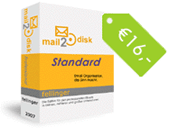 Standard
Standard |
Overview |
 |
 |
Features |
 |
 |
Screenshots |
 |
 |
System Requirements |
 |
Advantages of mail2disk Standard
Archive in multiple file formats
Besides the Outlook® message format (*.MSG), you can also archive your emails in text format (*.TXT), HTML format (*.HTM), Rich Text Format (*.RTF), Word 97-2003 format (*.DOC), Portable Document Format (*.PDF) and in Extensible Markup Language format (*.XML).
Archiving with templates
Templates enable you to save the many different settings in the archiving process, like the file format, rules for creating the archive path or file name and a whole range of other options for use in future archiving tasks.
Flexible archive paths
Create your own rules for the archive path from a whole range of variables. Your archive path can therefore consist of a fixed part and a variable part (e.g. a project number or description, a business number, a client's name etc.).
Flexiblity by file name creation
The file names of the emails you are archiving can also be adapted to your own requirements using variables.
Archive file attachments
File attachments can be archived using the same options as for archiving emails. You can either save file attachments in the same folder as the emails they arrived in, or you can create a separate folder for the attachments in each email.
Automatically create archive folders
mail2disk can create new archive folders automatically.
Automatically change file date
To facilitate searching in Windows Explorer, the modification date of the files generated can be automatically changed to the date on which the email was received.
Avoid dupes
This function has been created to avoid duplicating emails distributed in workgroups.
Flag messages
If you do not want to delete archived messages straight away, you can flag them as archived in Outlook® for easier tracking.
Change language without restarting
mail2disk allows you to change the local language without closing the application. This is particularly useful for multi-user workstations. mail2disk currently supports German, English and French.
